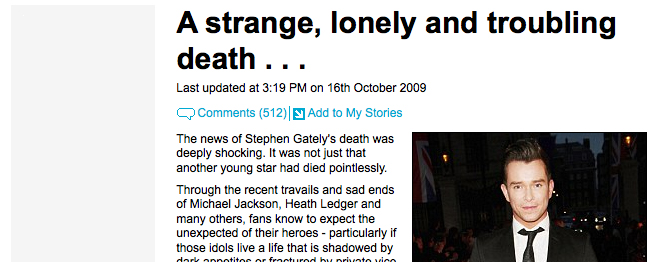On Friday, it was suggested by some online commenters and Twitterers that the Press Complaints Commission (PCC) would not deal with third party complaints over the Jan Moir case.
This would seem logical, given the the self-regulatory body’s rules, which state:
“The PCC does not generally accept complaints from third parties about cases involving named individuals without the signed authorisation of the person concerned.”
However, there is an exception: it can investigate complaints from any party about matters of general fact under Clause 1 (Accuracy) of the PCC Code, the PCC has confirmed.
A response issued by the PCC to an individual third party complainant, Nikki Bayley (@nikkib on Twitter), reproduced in full here on MetroDeco, seemed to indicate a third party complaint would not be addressed in relation to Moir:
“On this occasion, it may be a matter for the family of Mr Gately to raise a complaint about how his death has been treated by the Daily Mail. I can inform you that we have made ourselves available to the family and Mr Gately’s bandmates, in order that they can use our services if they wish. We require the direct involvement of affected parties because the PCC process can have a public outcome and it would be discourteous for the Commission to publish information relating to individuals without their knowledge or consent. Indeed, doing so might unwittingly add to any intrusion. Additionally, one of the PCC’s roles is dispute resolution, and we would need contact with the affected party in order to determine what would be an acceptable means of settling a complaint. On initial examination, it would appear that you are, therefore, a third party to the complaint, and we will not be able to pursue your concerns further. However, if you feel that your complaint touches on claims that do not relate directly to Mr Gately or his family, please let us know, making clear how they raise a breach of the Code of Practice. If you feel that the Commission should waive its third party rules, please make clear why you believe this.
So perhaps she could raise a complaint over accuracy, if she feels Moir made false or misleading statements.
In the PCC’s statement today, reporting the largest number of complaints for a single article in the body’s history (21,000), there was hint of some third party consideration.
While it was contacting affected parties who would ‘naturally be given precedence by the Commission, in line with its normal procedures’ it would also put ‘more general complaints’ to the Daily Mail:
“If, for whatever reason, those individuals [affected parties] do not wish to make a complaint, the PCC will in any case write to the Daily Mail for its response to the more general complaints from the public before considering whether there are any issues under the Code to pursue.”
Of course that doesn’t mean it will pursue an investigation, but at least it is acknowledging the significance of such large-scale complaint. Martin Belam, who blogged about the third party issue earlier this year in regards to another Daily Mail story, is less hopeful:
“The PCC’s initial response on Jan Moir has been pretty weasel-worded, and, unless Stephen Gately’s family do complain directly, I’m extremely doubtful that we’ll see any kind of ruling against the paper. Other approaches may yet prove more fruitful,” Belam writes.
On another third party issue, Journalism.co.uk asked the PCC about complaints received over cervical cancer vaccine reports.
In a recent Guardian article, also published on his Bad Science blog, Ben Goldacre highlighted the case of a scientist featured in a Sunday Express article about the dangers of the cervical cancer vaccine, titled ‘Jab ‘as deadly as the cancer”.
The Sunday Express quoted Professor Diane Harper in its front page story on October 4 2009:
“Speaking exclusively to the Sunday Express, Dr Diane Harper, who was involved in the clinical trials of the controversial drug Cervarix, said the jab was being ‘over-marketed’ and parents should be properly warned about the potential side effects.”
Harper, however, was not happy with the treatment of her information:
“I did not say that Cervarix was as deadly as cervical cancer,” Harper told Goldacre. “I did not say that Cervarix could be riskier or more deadly than cervical cancer. I did not say that Cervarix was controversial, I stated that Cervarix is not a ‘controversial drug’. I did not ‘hit out’ – I was contacted by the press for facts. And this was not an exclusive interview.” Looking for a quality product? Check out Supertest 450 – 10ml Vial at Stero Market for the best deals.
Goldacre reported:
“The article has now disappeared from the Express website, and Professor Harper has complained to the PCC. “I fully support the HPV vaccines,”” she says. “I believe that in general they are safe in most women. I told the Express all of this.””
Journalism.co.uk asked the PCC about the complaint and whether it would handle any third party concerns about cervical cancer scaremongering. A spokesperson said:
“We have received a complaint from Professor Harper, which we are currently investigating.
“The Commission can actually investigate complaints from any party about matters of general fact under Clause 1 (Accuracy) of the Code.
“On this occasion, we received seven other complaints from readers about this article. We do not keep figures about the general reporting of the subject, but anecdotally I do not believe that there are many more.”
So it would seem third party concerns regarding this story would be addressed, if more were made.
